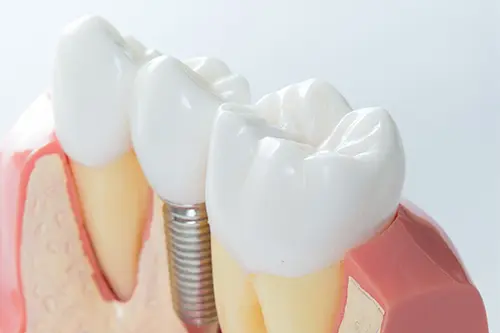Reviewed by Dr. Kerri Font, DDS

Reading time: four minutes.
If you lose a back molar, you might wonder whether replacing it is really necessary. Some patients assume that because molar teeth are not visible when smiling, they are less important.
That is not the case! Molars have important functions that affect the entire mouth and overall oral health.
In this blog, you will learn why it is important to replace a molar with a dental implant, what could happen if you delay replacement, and what other tooth replacement options are available.
Table of Contents
- Why Molars Are Important
- Are Dental Implants Necessary For Molars?
- Schedule a Dental Implant Consultation in Highlands Ranch, CO
- FAQs About Molar Dental Implants
Key Takeaway
You should replace a missing molar with a dental implant to protect your jawbone, bite, and oral function. Leaving a gap risks serious long-term problems like bone loss, tooth shifting, and future dental complications.
Why Molars Are Important
Molars are not just chewing teeth. They are pillars that support your jaw, bite alignment, and even facial structure. When a molar is missing, these functions are compromised, creating a domino effect on oral health issues.
Key roles of molars include:
- Maintaining bite balance: Molars distribute chewing forces evenly, preventing strain on adjacent teeth and front flat teeth.
- Preserving jawbone density: Our teeth stimulate the bone when we chew. Missing even just one tooth can lead to bone loss over time.
- Supporting facial shape: Without molars, the face can sag or look sunken as bone volume decreases, impacting facial aesthetics.
- Preventing shifting teeth: Neighboring teeth drift into empty spaces, causing bite issues and misalignment.
Are Dental Implants Necessary For Molars?
The short answer: yes, in most cases dental implants for molars are necessary. A dental implant acts like a natural tooth root that stimulates the jawbone and supports the surrounding teeth.
Unlike partial dentures or dental bridges, an implant does not require modifying healthy adjacent teeth. This makes it the most conservative and effective solution.
If a molar is not replaced, you risk:
- Shifting of adjacent and opposing teeth
- Increased wear on remaining real teeth
- Jawbone deterioration and bone loss
- Bite changes leading to TMJ disorders and strained jaw muscles
- Difficulty chewing, loss of oral function, and dietary limitations
What Happens If You Delay Getting A Molar Implant
Delaying the replacement of a missing molar can lead to progressive bone loss in the jaw. Without the stimulation provided by a natural tooth root, the bone in that area begins to shrink—often by as much as 25% within the first year.
As the bone continues to deteriorate, placing a dental implant becomes more complex. Additional procedures, such as bone grafting, may be required to rebuild the area and ensure long-term implant stability.
Even if chewing feels unaffected initially, gradual changes occur beneath the surface. Adjacent teeth can shift, bite alignment may suffer, and treatment becomes more involved—both medically and financially—the longer the delay.
Schedule a Dental Implant Consultation in Highlands Ranch, CO
At Highlands Ranch Periodontics & Dental Implants, our skilled periodontists, Dr. Bahman (Mike) Norouzinia, DDS, and Dr. Kerri Font, DDS, specialize in dental implants. Our services include:
- Dental implants: Placing titanium metal posts that integrate with your natural bone.
- Dental bone grafting: Restoring bone volume when needed to support implants with the help of bone graft materials.
- Computer guided surgery: Enhancing precision for optimal implant placement.
- Socket preservation: Protecting gum tissue and bone immediately after extraction to prepare for future dental implant surgery.
To book a dental implant consultation at our periodontal clinic in Highlands Ranch, CO, call (303) 683-1144 or visit us at 9090 S Ridgeline Blvd. #225, Highlands Ranch, CO 80129.
FAQs About Molar Dental Implants
Yes, replacing a back molar with a single tooth implant helps preserve the jawbone, prevent teeth from shifting, and maintain your bite alignment. Even if the gap is not visible when smiling, the molar plays a big role in chewing, jawbone density, and long-term oral health.
If a missing molar is not replaced, the surrounding teeth can gradually shift out of place, affecting your bite and alignment. The jawbone in that area will also begin to shrink due to lack of stimulation. Over time, this can lead to reduced chewing efficiency, increased stress on remaining teeth, and more complex treatment needs such as bone grafting or corrective procedures to restore function and stability.
While it is possible to live without a back molar, it is not ideal for your long-term oral health. Over time, missing a molar can compromise your ability to chew properly, cause changes in tooth alignment, increase the risk of tooth decay, and place added strain on the remaining teeth.
